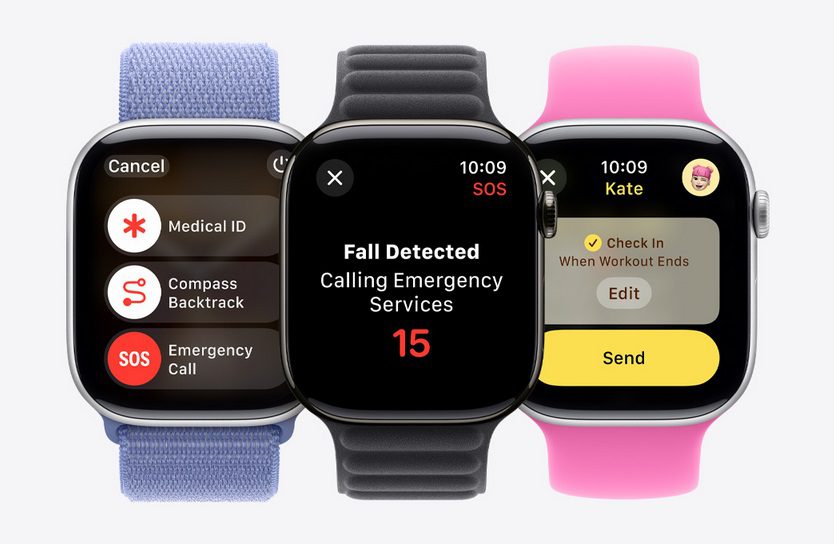
Apple Scraps Watch Camera Plans: The idea of a camera-equipped Apple Watch has been in development for years, with patents dating back to 2019. Apple explored innovative designs, such as embedding cameras in the Digital Crown or integrating them into the watch strap, to bring new functionality to its smartwatch lineup.
Contents
- 1 Recent Rumors Dashed
- 2 What is Visual Intelligence?
- 3 Missed Opportunity for Apple Watch
- 4 A New Frontier for Audio Wearables
- 5 Potential Features and Benefits
- 6 Alignment with Smart Glasses
- 7 Challenges with Apple Intelligence
- 8 Steering Clear of Standalone AI Devices
- 9 iOS 19 and Third-Party Integration
- 10 Lessons from Failed AI Gadgets
- 11 A Bright Future for Wearables
Recent Rumors Dashed
As recently as March 2025, industry insiders speculated that Apple would introduce cameras to both the standard Apple Watch and Apple Watch Ultra by 2027. The proposed designs included a front-facing camera within the display for both models, with the Ultra also featuring a side-mounted lens near the crown and button. These cameras were expected to enable Visual Intelligence, allowing users to interact with their environment through AI-driven features.
However, Bloomberg’s report confirms that Apple has scrapped these plans entirely. The decision may stem from challenges in balancing camera integration with the Apple Watch’s sleek design, battery life, and user experience.
Visual Intelligence: A Game-Changer for Wearables
What is Visual Intelligence?
Visual Intelligence, a cornerstone of Apple Intelligence, uses built-in cameras and AI to provide contextual information about a user’s surroundings. Currently available on the iPhone 16 series and iPhone 15 Pro, it enables tasks like scanning a poster to create a calendar event or identifying dog breeds with a single snapshot.
Missed Opportunity for Apple Watch
Had the camera-equipped Apple Watch moved forward, it would have brought these capabilities to users’ wrists. For example, users could have pointed their watch at a landmark to receive instant information or scanned a menu for nutritional details, all powered by Apple Intelligence. The cancellation of this project leaves a gap in Apple’s smartwatch roadmap, but the company is already eyeing another device to fill it.
AirPods Set to Gain Cameras
A New Frontier for Audio Wearables
Apple is now focusing on integrating cameras into its AirPods, with development reportedly underway for a 2026 debut. These camera-equipped AirPods could enable Visual Intelligence features, allowing users to interact with their environment hands-free. For instance, AirPods could transmit visual data to an iPhone in a user’s pocket, providing real-time information like navigation directions or business details.
Potential Features and Benefits
The addition of cameras to AirPods could unlock a range of innovative use cases:
Hands-Free Navigation: AirPods could guide users to their destination using visual cues, enhancing accessibility for pedestrians or visually impaired users.
Environmental Insights: By analyzing surroundings, AirPods could identify objects, translate signs, or provide contextual data without requiring users to pull out their iPhone.
Integration with iOS 19: Rumors suggest that iOS 19, expected in 2026, may introduce live translation features for AirPods, making them a powerful tool for multilingual communication.
Alignment with Smart Glasses
Apple’s camera-equipped AirPods may launch alongside its rumored smart glasses, also slated for 2026. Both devices are expected to leverage Visual Intelligence, creating a cohesive AI-driven ecosystem for Apple’s wearables.
Apple’s AI Strategy: Enhancing Existing Products
Challenges with Apple Intelligence
Apple has been working to expand Apple Intelligence across its devices, including iPhones, iPads, and Macs. However, the rollout has faced hurdles, with advanced Siri features previewed at WWDC 2024 still delayed as of May 2025. These setbacks highlight the complexity of integrating AI into consumer devices while maintaining Apple’s commitment to privacy and performance.
Steering Clear of Standalone AI Devices
Unlike competitors like OpenAI, which recently acquired Sam Altman and Jony Ive’s AI startup “io” for $6.5 billion to develop an AI-themed necklace, Apple is avoiding dedicated AI companion devices. The failure of products like the Humane AI Pin and Rabbit R1 in 2024 and 2025 has likely reinforced Apple’s focus on enhancing its existing product categories, such as the iPhone, AirPods, and upcoming smart glasses.
iOS 19 and Third-Party Integration
Apple is poised to open its AI models to third-party developers with iOS 19, potentially enabling a new wave of AI-infused applications. This could enhance Visual Intelligence on devices like the iPhone and AirPods, offering developers more opportunities to create innovative, AI-driven experiences.
Why Apple’s Pivot Makes Sense
Lessons from Failed AI Gadgets
The lack of consumer interest in standalone AI devices like the Rabbit R1, often depicted as a quirky orange square with a digital display, underscores the challenge of introducing a third device alongside smartphones and laptops. Apple’s decision to integrate AI into its existing ecosystem ensures that new features complement rather than compete with its flagship products.
A Bright Future for Wearables
By focusing on AirPods and smart glasses, Apple is positioning its wearables as key components of its AI-driven future. These devices promise to deliver seamless, hands-free experiences that align with consumer preferences for integrated technology.
Looking Ahead
Apple’s decision to abandon a camera-equipped Apple Watch in favor of AirPods with Visual Intelligence reflects its strategic focus on enhancing its core products with AI capabilities. As the company prepares for a 2026 launch of camera-equipped AirPods and smart glasses, consumers can expect a new era of wearable technology that blends innovation with practicality.

